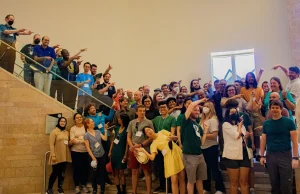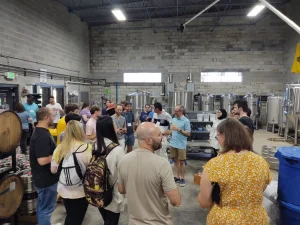Major Mathematics Conference Hosted at Valparaiso University

June 21, 2022, was an unusual day at Four Fathers Brewing in Valparaiso. Not only had they unveiled a new IPA named after a major academic conference, but an international crowd of some of the top minds in the field of mathematics and statistics had arrived at their establishment to appreciate the brew and tour the facility.
Permutation Patterns — the conference, not the beverage — is an annual, international mathematics conference that began in 2003. After being an attendee for 16 conferences and a member of the steering committee for 10, Lara Pudwell ’03, Ph.D., professor of mathematics and statistics at Valparaiso University, managed to bring the conference to her alma mater and current workplace.

Valparaiso University was chosen due to Professor Pudwell’s involvement, the University’s programs in the appropriate areas of research, and the amazing atmosphere of interdepartmental collaboration and support that makes Valpo a unique institution.
“Valpo has run most of the National Science Foundation Grants that have supported the conference in the last decade because our financial office is so much more responsive than at most other schools,” Professor Pudwell says. “Conference Services were great, I.T. was great. Valpo is the kind of place where I know the first name of the person I need to talk to and they’re happy to help.”
Sixty experts from eight countries converged on Valpo starting June 20 for five days of discussion and collaboration on mathematical topics related to sorting algorithms and computer science. Among them were keynote speakers Mathilde Bouvel, a prominent French permutation researcher, and Pamela Harris, an associate professor of mathematics at Williams College.
While the challenge of coordinating such a wide range of people was daunting, Professor Pudwell and the other participants were ecstatic to have an in-person event after two years of virtual conferences.
“There is a lot of networking that doesn’t happen the same way over Zoom,” Professor Pudwell says. “Half of the conference went to the brewery to try the math beer on Tuesday. Half of us went to Valpo Velvet Ice Cream Parlor another day. Those are things that just don’t happen virtually.”
Many of the talks and conversations have led to connections that are continuing to push the discipline. One speaker from Australia, Murray Elder from University of Technology Sydney, inspired Professor Pudwell to write code that very evening to explore the expressed ideas, leading the two to a continuing email conversation about where their research can continue to develop. That continuing conversation is just one example of the ways that in-person collaboration between experts can advance mathematics.
“The conference really seeded a lot of interesting conversations,” Professor Pudwell says.
Research of pure mathematics may not have an immediate impact for the general public outside of academic conferences, but what these academics discover today can help bear unexpected fruit even decades later.
“It’s a similar attitude to why we climb mountains: for the challenge and for the beautiful view of the landscape,” Professor Pudwell says. “It doesn’t mean we know the applications right off, but we’re building an encyclopedia of answers that people can look up later. Someone may be doing research decades from now and find an article based on what we’ve done now that helps their own work.”
Hosting the event also has a positive impact on Valparaiso University’s international reputation as a hub of academic excellence.
“There are now more than 50 mathematicians from around the world who have a positive, in-person impression of the campus and math department who may never have actually visited Valpo otherwise,” Professor Pudwell says. “More generally, it’s an excellent example of the University fostering international dialogue and bringing people together for academic conversations.”
The 2023 Permutation Patterns conference will be held in Dijon, France. The event is made possible by grants from the National Science Foundation and the National Security Agency.
